Leadership Skills: Kindergarten Teachers' Role and Importance
VerifiedAdded on 2022/10/16
|13
|3605
|269
Essay
AI Summary
This essay delves into the critical role of leadership in kindergarten education, highlighting the importance of teachers possessing leadership skills to effectively guide and inspire young children. It explores the significance of charismatic and transformational leadership styles, emphasizing how these approaches can foster a positive and engaging learning environment. The essay discusses the various roles and responsibilities of kindergarten teachers, including curriculum development, communication with parents, and creating a supportive classroom atmosphere. Furthermore, it examines factors that influence teacher leadership, such as goal setting and problem-solving approaches. The essay also provides insights into training methods designed to cultivate transformational and charismatic leadership attributes among kindergarten teachers, ensuring they are well-equipped to meet the unique needs of their students and promote their overall development. The essay emphasizes the need for teachers to personalize their management skills, encourage creativity, and serve as role models for the children, fostering an environment where children can explore, learn, and grow.
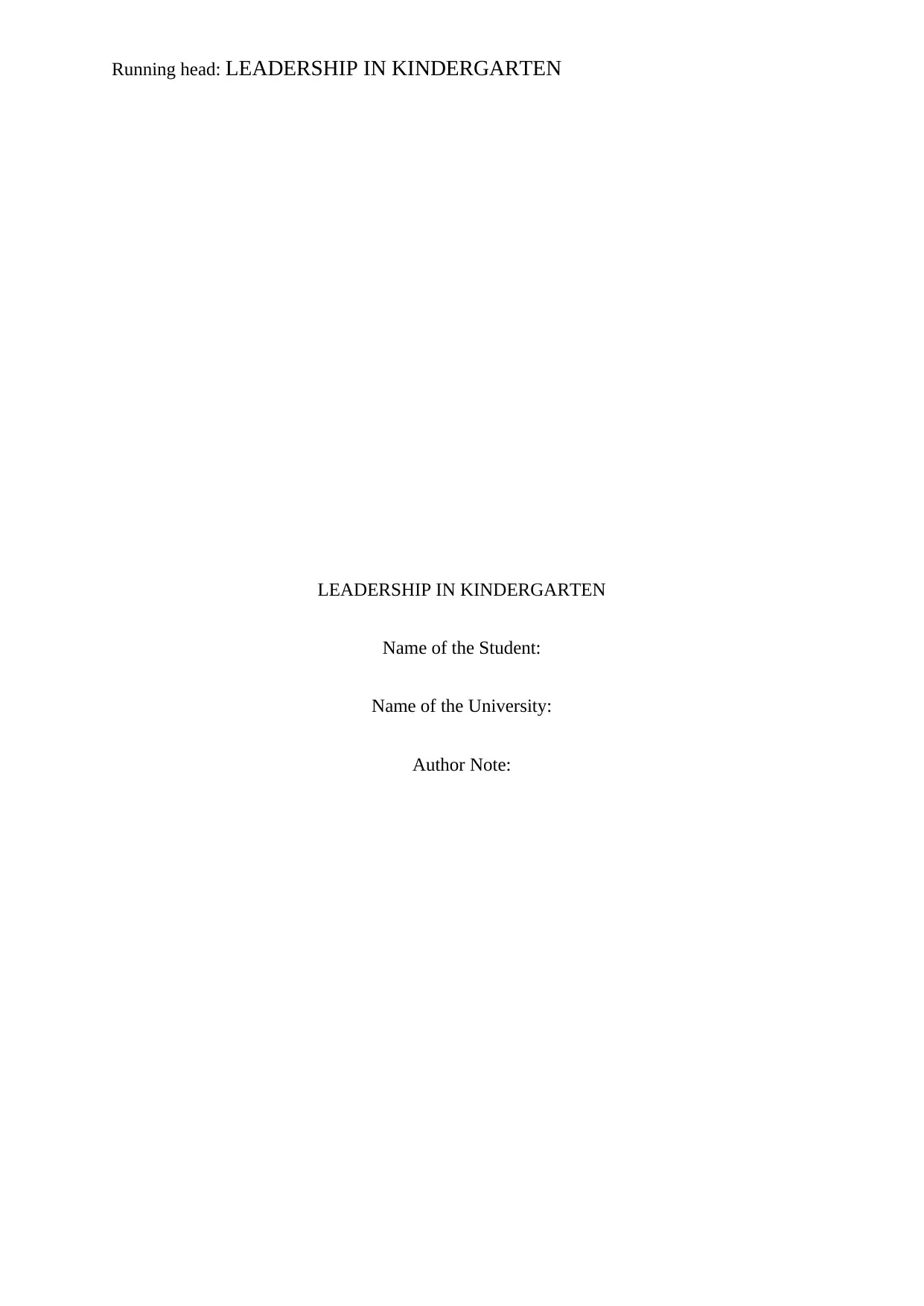
Running head: LEADERSHIP IN KINDERGARTEN
LEADERSHIP IN KINDERGARTEN
Name of the Student:
Name of the University:
Author Note:
LEADERSHIP IN KINDERGARTEN
Name of the Student:
Name of the University:
Author Note:
Paraphrase This Document
Need a fresh take? Get an instant paraphrase of this document with our AI Paraphraser
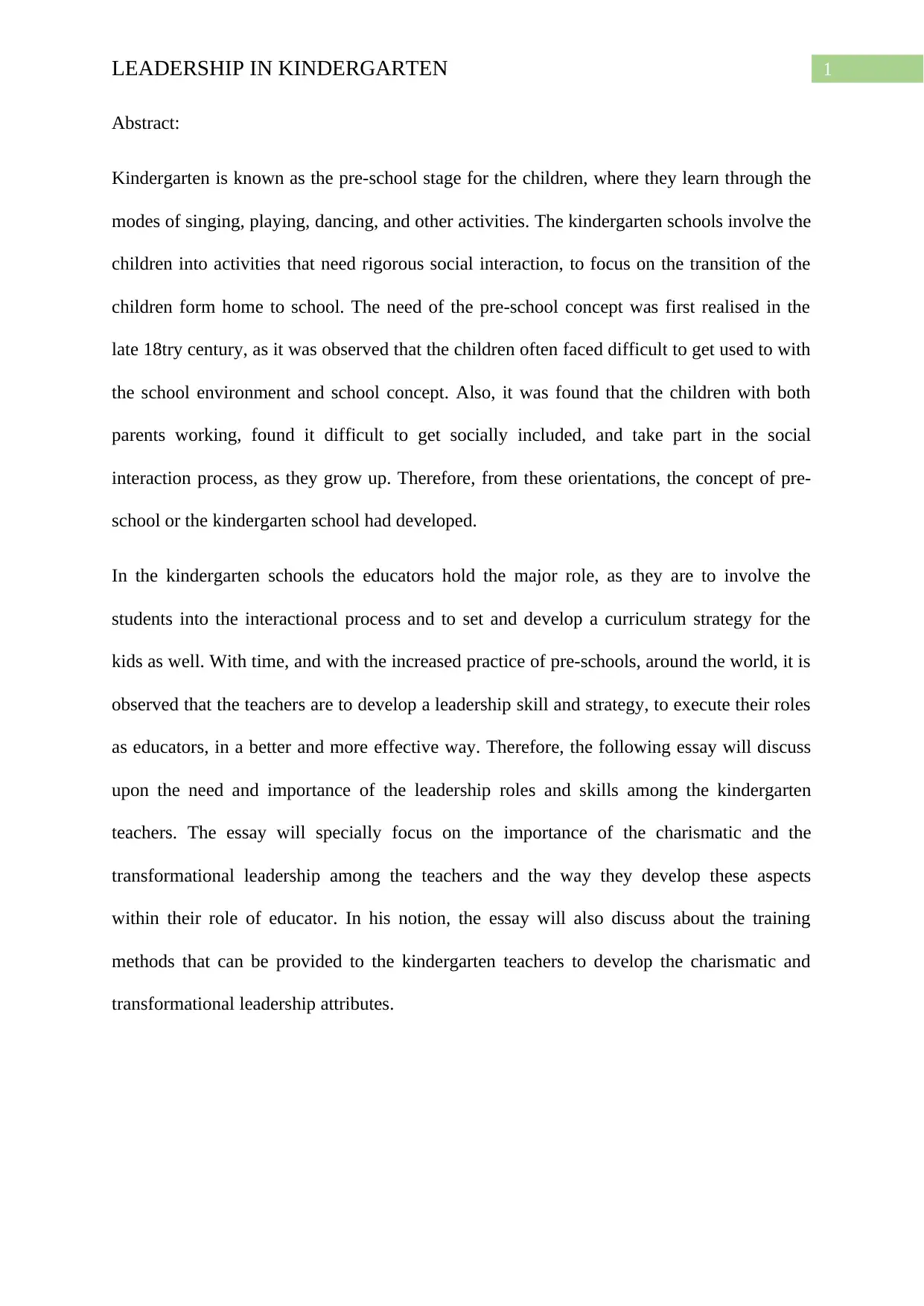
1LEADERSHIP IN KINDERGARTEN
Abstract:
Kindergarten is known as the pre-school stage for the children, where they learn through the
modes of singing, playing, dancing, and other activities. The kindergarten schools involve the
children into activities that need rigorous social interaction, to focus on the transition of the
children form home to school. The need of the pre-school concept was first realised in the
late 18try century, as it was observed that the children often faced difficult to get used to with
the school environment and school concept. Also, it was found that the children with both
parents working, found it difficult to get socially included, and take part in the social
interaction process, as they grow up. Therefore, from these orientations, the concept of pre-
school or the kindergarten school had developed.
In the kindergarten schools the educators hold the major role, as they are to involve the
students into the interactional process and to set and develop a curriculum strategy for the
kids as well. With time, and with the increased practice of pre-schools, around the world, it is
observed that the teachers are to develop a leadership skill and strategy, to execute their roles
as educators, in a better and more effective way. Therefore, the following essay will discuss
upon the need and importance of the leadership roles and skills among the kindergarten
teachers. The essay will specially focus on the importance of the charismatic and the
transformational leadership among the teachers and the way they develop these aspects
within their role of educator. In his notion, the essay will also discuss about the training
methods that can be provided to the kindergarten teachers to develop the charismatic and
transformational leadership attributes.
Abstract:
Kindergarten is known as the pre-school stage for the children, where they learn through the
modes of singing, playing, dancing, and other activities. The kindergarten schools involve the
children into activities that need rigorous social interaction, to focus on the transition of the
children form home to school. The need of the pre-school concept was first realised in the
late 18try century, as it was observed that the children often faced difficult to get used to with
the school environment and school concept. Also, it was found that the children with both
parents working, found it difficult to get socially included, and take part in the social
interaction process, as they grow up. Therefore, from these orientations, the concept of pre-
school or the kindergarten school had developed.
In the kindergarten schools the educators hold the major role, as they are to involve the
students into the interactional process and to set and develop a curriculum strategy for the
kids as well. With time, and with the increased practice of pre-schools, around the world, it is
observed that the teachers are to develop a leadership skill and strategy, to execute their roles
as educators, in a better and more effective way. Therefore, the following essay will discuss
upon the need and importance of the leadership roles and skills among the kindergarten
teachers. The essay will specially focus on the importance of the charismatic and the
transformational leadership among the teachers and the way they develop these aspects
within their role of educator. In his notion, the essay will also discuss about the training
methods that can be provided to the kindergarten teachers to develop the charismatic and
transformational leadership attributes.
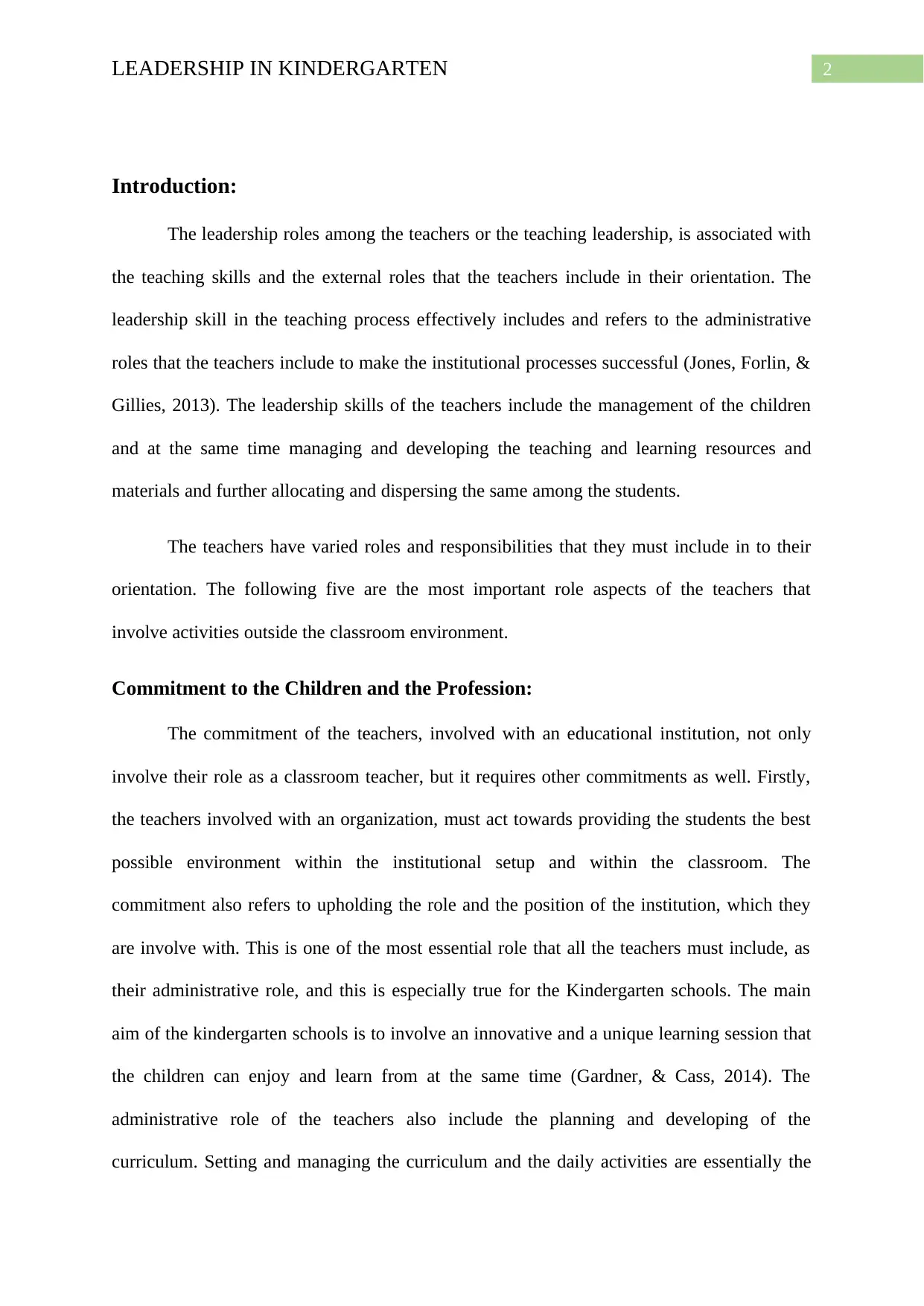
2LEADERSHIP IN KINDERGARTEN
Introduction:
The leadership roles among the teachers or the teaching leadership, is associated with
the teaching skills and the external roles that the teachers include in their orientation. The
leadership skill in the teaching process effectively includes and refers to the administrative
roles that the teachers include to make the institutional processes successful (Jones, Forlin, &
Gillies, 2013). The leadership skills of the teachers include the management of the children
and at the same time managing and developing the teaching and learning resources and
materials and further allocating and dispersing the same among the students.
The teachers have varied roles and responsibilities that they must include in to their
orientation. The following five are the most important role aspects of the teachers that
involve activities outside the classroom environment.
Commitment to the Children and the Profession:
The commitment of the teachers, involved with an educational institution, not only
involve their role as a classroom teacher, but it requires other commitments as well. Firstly,
the teachers involved with an organization, must act towards providing the students the best
possible environment within the institutional setup and within the classroom. The
commitment also refers to upholding the role and the position of the institution, which they
are involve with. This is one of the most essential role that all the teachers must include, as
their administrative role, and this is especially true for the Kindergarten schools. The main
aim of the kindergarten schools is to involve an innovative and a unique learning session that
the children can enjoy and learn from at the same time (Gardner, & Cass, 2014). The
administrative role of the teachers also include the planning and developing of the
curriculum. Setting and managing the curriculum and the daily activities are essentially the
Introduction:
The leadership roles among the teachers or the teaching leadership, is associated with
the teaching skills and the external roles that the teachers include in their orientation. The
leadership skill in the teaching process effectively includes and refers to the administrative
roles that the teachers include to make the institutional processes successful (Jones, Forlin, &
Gillies, 2013). The leadership skills of the teachers include the management of the children
and at the same time managing and developing the teaching and learning resources and
materials and further allocating and dispersing the same among the students.
The teachers have varied roles and responsibilities that they must include in to their
orientation. The following five are the most important role aspects of the teachers that
involve activities outside the classroom environment.
Commitment to the Children and the Profession:
The commitment of the teachers, involved with an educational institution, not only
involve their role as a classroom teacher, but it requires other commitments as well. Firstly,
the teachers involved with an organization, must act towards providing the students the best
possible environment within the institutional setup and within the classroom. The
commitment also refers to upholding the role and the position of the institution, which they
are involve with. This is one of the most essential role that all the teachers must include, as
their administrative role, and this is especially true for the Kindergarten schools. The main
aim of the kindergarten schools is to involve an innovative and a unique learning session that
the children can enjoy and learn from at the same time (Gardner, & Cass, 2014). The
administrative role of the teachers also include the planning and developing of the
curriculum. Setting and managing the curriculum and the daily activities are essentially the
⊘ This is a preview!⊘
Do you want full access?
Subscribe today to unlock all pages.

Trusted by 1+ million students worldwide
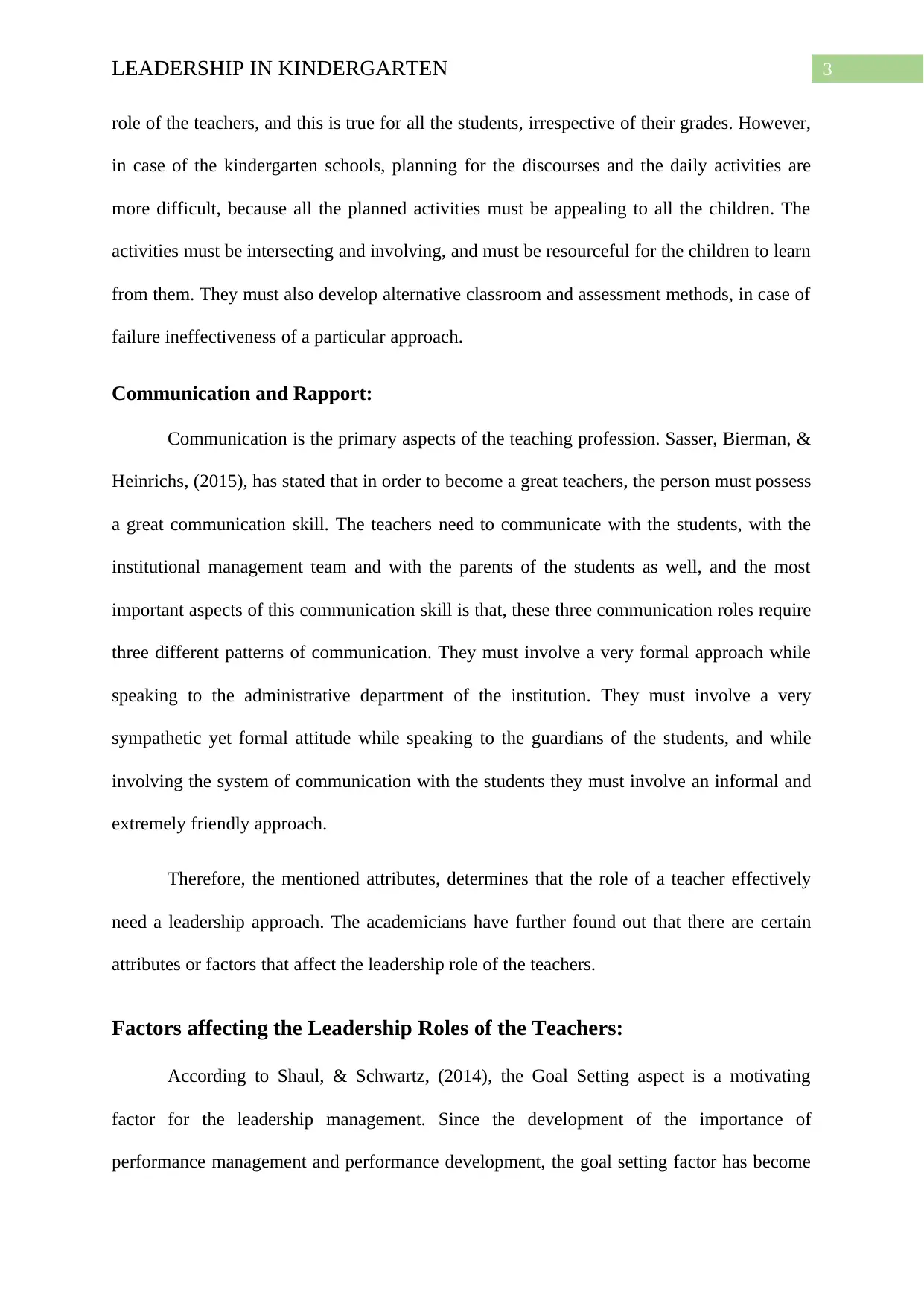
3LEADERSHIP IN KINDERGARTEN
role of the teachers, and this is true for all the students, irrespective of their grades. However,
in case of the kindergarten schools, planning for the discourses and the daily activities are
more difficult, because all the planned activities must be appealing to all the children. The
activities must be intersecting and involving, and must be resourceful for the children to learn
from them. They must also develop alternative classroom and assessment methods, in case of
failure ineffectiveness of a particular approach.
Communication and Rapport:
Communication is the primary aspects of the teaching profession. Sasser, Bierman, &
Heinrichs, (2015), has stated that in order to become a great teachers, the person must possess
a great communication skill. The teachers need to communicate with the students, with the
institutional management team and with the parents of the students as well, and the most
important aspects of this communication skill is that, these three communication roles require
three different patterns of communication. They must involve a very formal approach while
speaking to the administrative department of the institution. They must involve a very
sympathetic yet formal attitude while speaking to the guardians of the students, and while
involving the system of communication with the students they must involve an informal and
extremely friendly approach.
Therefore, the mentioned attributes, determines that the role of a teacher effectively
need a leadership approach. The academicians have further found out that there are certain
attributes or factors that affect the leadership role of the teachers.
Factors affecting the Leadership Roles of the Teachers:
According to Shaul, & Schwartz, (2014), the Goal Setting aspect is a motivating
factor for the leadership management. Since the development of the importance of
performance management and performance development, the goal setting factor has become
role of the teachers, and this is true for all the students, irrespective of their grades. However,
in case of the kindergarten schools, planning for the discourses and the daily activities are
more difficult, because all the planned activities must be appealing to all the children. The
activities must be intersecting and involving, and must be resourceful for the children to learn
from them. They must also develop alternative classroom and assessment methods, in case of
failure ineffectiveness of a particular approach.
Communication and Rapport:
Communication is the primary aspects of the teaching profession. Sasser, Bierman, &
Heinrichs, (2015), has stated that in order to become a great teachers, the person must possess
a great communication skill. The teachers need to communicate with the students, with the
institutional management team and with the parents of the students as well, and the most
important aspects of this communication skill is that, these three communication roles require
three different patterns of communication. They must involve a very formal approach while
speaking to the administrative department of the institution. They must involve a very
sympathetic yet formal attitude while speaking to the guardians of the students, and while
involving the system of communication with the students they must involve an informal and
extremely friendly approach.
Therefore, the mentioned attributes, determines that the role of a teacher effectively
need a leadership approach. The academicians have further found out that there are certain
attributes or factors that affect the leadership role of the teachers.
Factors affecting the Leadership Roles of the Teachers:
According to Shaul, & Schwartz, (2014), the Goal Setting aspect is a motivating
factor for the leadership management. Since the development of the importance of
performance management and performance development, the goal setting factor has become
Paraphrase This Document
Need a fresh take? Get an instant paraphrase of this document with our AI Paraphraser
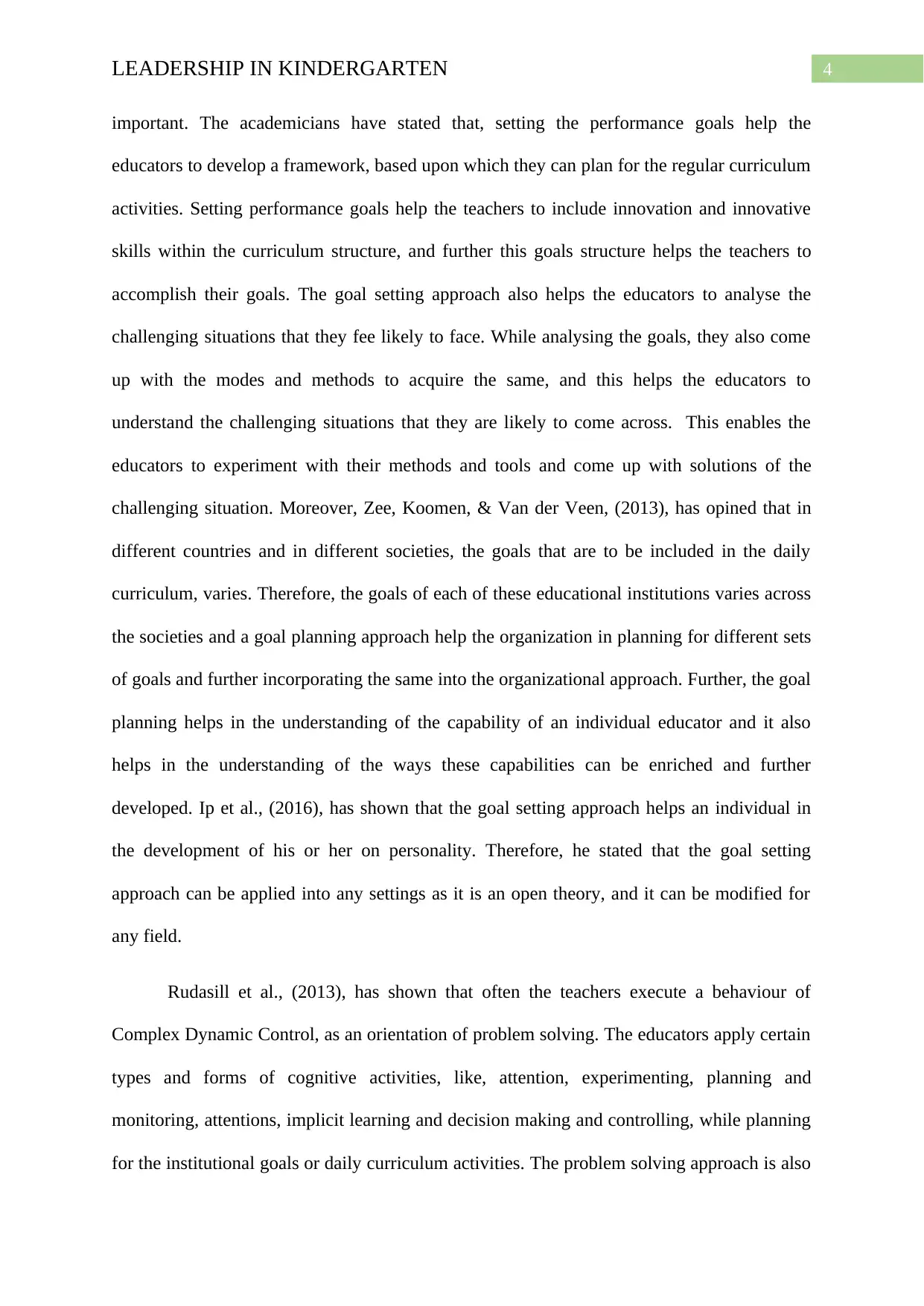
4LEADERSHIP IN KINDERGARTEN
important. The academicians have stated that, setting the performance goals help the
educators to develop a framework, based upon which they can plan for the regular curriculum
activities. Setting performance goals help the teachers to include innovation and innovative
skills within the curriculum structure, and further this goals structure helps the teachers to
accomplish their goals. The goal setting approach also helps the educators to analyse the
challenging situations that they fee likely to face. While analysing the goals, they also come
up with the modes and methods to acquire the same, and this helps the educators to
understand the challenging situations that they are likely to come across. This enables the
educators to experiment with their methods and tools and come up with solutions of the
challenging situation. Moreover, Zee, Koomen, & Van der Veen, (2013), has opined that in
different countries and in different societies, the goals that are to be included in the daily
curriculum, varies. Therefore, the goals of each of these educational institutions varies across
the societies and a goal planning approach help the organization in planning for different sets
of goals and further incorporating the same into the organizational approach. Further, the goal
planning helps in the understanding of the capability of an individual educator and it also
helps in the understanding of the ways these capabilities can be enriched and further
developed. Ip et al., (2016), has shown that the goal setting approach helps an individual in
the development of his or her on personality. Therefore, he stated that the goal setting
approach can be applied into any settings as it is an open theory, and it can be modified for
any field.
Rudasill et al., (2013), has shown that often the teachers execute a behaviour of
Complex Dynamic Control, as an orientation of problem solving. The educators apply certain
types and forms of cognitive activities, like, attention, experimenting, planning and
monitoring, attentions, implicit learning and decision making and controlling, while planning
for the institutional goals or daily curriculum activities. The problem solving approach is also
important. The academicians have stated that, setting the performance goals help the
educators to develop a framework, based upon which they can plan for the regular curriculum
activities. Setting performance goals help the teachers to include innovation and innovative
skills within the curriculum structure, and further this goals structure helps the teachers to
accomplish their goals. The goal setting approach also helps the educators to analyse the
challenging situations that they fee likely to face. While analysing the goals, they also come
up with the modes and methods to acquire the same, and this helps the educators to
understand the challenging situations that they are likely to come across. This enables the
educators to experiment with their methods and tools and come up with solutions of the
challenging situation. Moreover, Zee, Koomen, & Van der Veen, (2013), has opined that in
different countries and in different societies, the goals that are to be included in the daily
curriculum, varies. Therefore, the goals of each of these educational institutions varies across
the societies and a goal planning approach help the organization in planning for different sets
of goals and further incorporating the same into the organizational approach. Further, the goal
planning helps in the understanding of the capability of an individual educator and it also
helps in the understanding of the ways these capabilities can be enriched and further
developed. Ip et al., (2016), has shown that the goal setting approach helps an individual in
the development of his or her on personality. Therefore, he stated that the goal setting
approach can be applied into any settings as it is an open theory, and it can be modified for
any field.
Rudasill et al., (2013), has shown that often the teachers execute a behaviour of
Complex Dynamic Control, as an orientation of problem solving. The educators apply certain
types and forms of cognitive activities, like, attention, experimenting, planning and
monitoring, attentions, implicit learning and decision making and controlling, while planning
for the institutional goals or daily curriculum activities. The problem solving approach is also
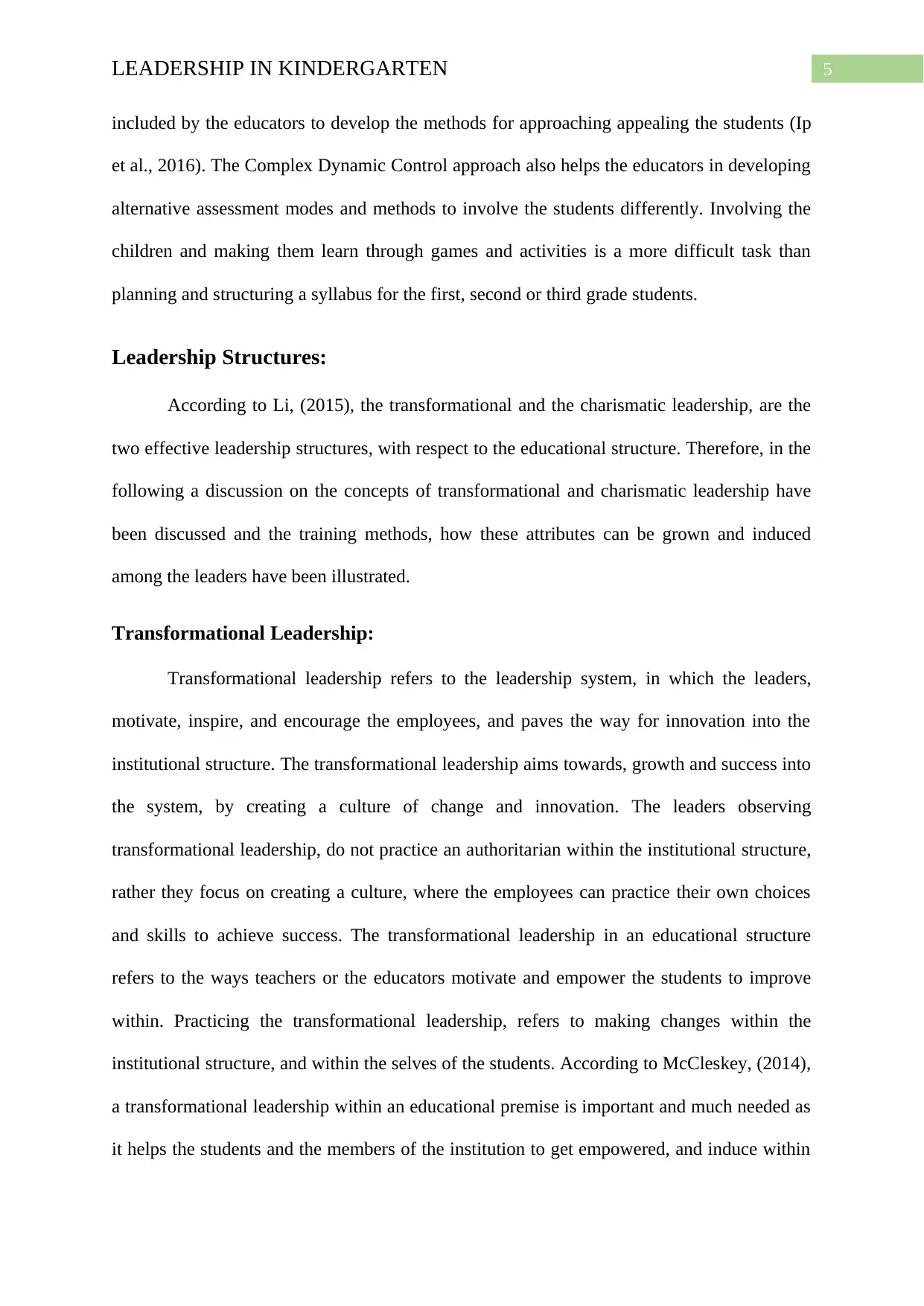
5LEADERSHIP IN KINDERGARTEN
included by the educators to develop the methods for approaching appealing the students (Ip
et al., 2016). The Complex Dynamic Control approach also helps the educators in developing
alternative assessment modes and methods to involve the students differently. Involving the
children and making them learn through games and activities is a more difficult task than
planning and structuring a syllabus for the first, second or third grade students.
Leadership Structures:
According to Li, (2015), the transformational and the charismatic leadership, are the
two effective leadership structures, with respect to the educational structure. Therefore, in the
following a discussion on the concepts of transformational and charismatic leadership have
been discussed and the training methods, how these attributes can be grown and induced
among the leaders have been illustrated.
Transformational Leadership:
Transformational leadership refers to the leadership system, in which the leaders,
motivate, inspire, and encourage the employees, and paves the way for innovation into the
institutional structure. The transformational leadership aims towards, growth and success into
the system, by creating a culture of change and innovation. The leaders observing
transformational leadership, do not practice an authoritarian within the institutional structure,
rather they focus on creating a culture, where the employees can practice their own choices
and skills to achieve success. The transformational leadership in an educational structure
refers to the ways teachers or the educators motivate and empower the students to improve
within. Practicing the transformational leadership, refers to making changes within the
institutional structure, and within the selves of the students. According to McCleskey, (2014),
a transformational leadership within an educational premise is important and much needed as
it helps the students and the members of the institution to get empowered, and induce within
included by the educators to develop the methods for approaching appealing the students (Ip
et al., 2016). The Complex Dynamic Control approach also helps the educators in developing
alternative assessment modes and methods to involve the students differently. Involving the
children and making them learn through games and activities is a more difficult task than
planning and structuring a syllabus for the first, second or third grade students.
Leadership Structures:
According to Li, (2015), the transformational and the charismatic leadership, are the
two effective leadership structures, with respect to the educational structure. Therefore, in the
following a discussion on the concepts of transformational and charismatic leadership have
been discussed and the training methods, how these attributes can be grown and induced
among the leaders have been illustrated.
Transformational Leadership:
Transformational leadership refers to the leadership system, in which the leaders,
motivate, inspire, and encourage the employees, and paves the way for innovation into the
institutional structure. The transformational leadership aims towards, growth and success into
the system, by creating a culture of change and innovation. The leaders observing
transformational leadership, do not practice an authoritarian within the institutional structure,
rather they focus on creating a culture, where the employees can practice their own choices
and skills to achieve success. The transformational leadership in an educational structure
refers to the ways teachers or the educators motivate and empower the students to improve
within. Practicing the transformational leadership, refers to making changes within the
institutional structure, and within the selves of the students. According to McCleskey, (2014),
a transformational leadership within an educational premise is important and much needed as
it helps the students and the members of the institution to get empowered, and induce within
⊘ This is a preview!⊘
Do you want full access?
Subscribe today to unlock all pages.

Trusted by 1+ million students worldwide
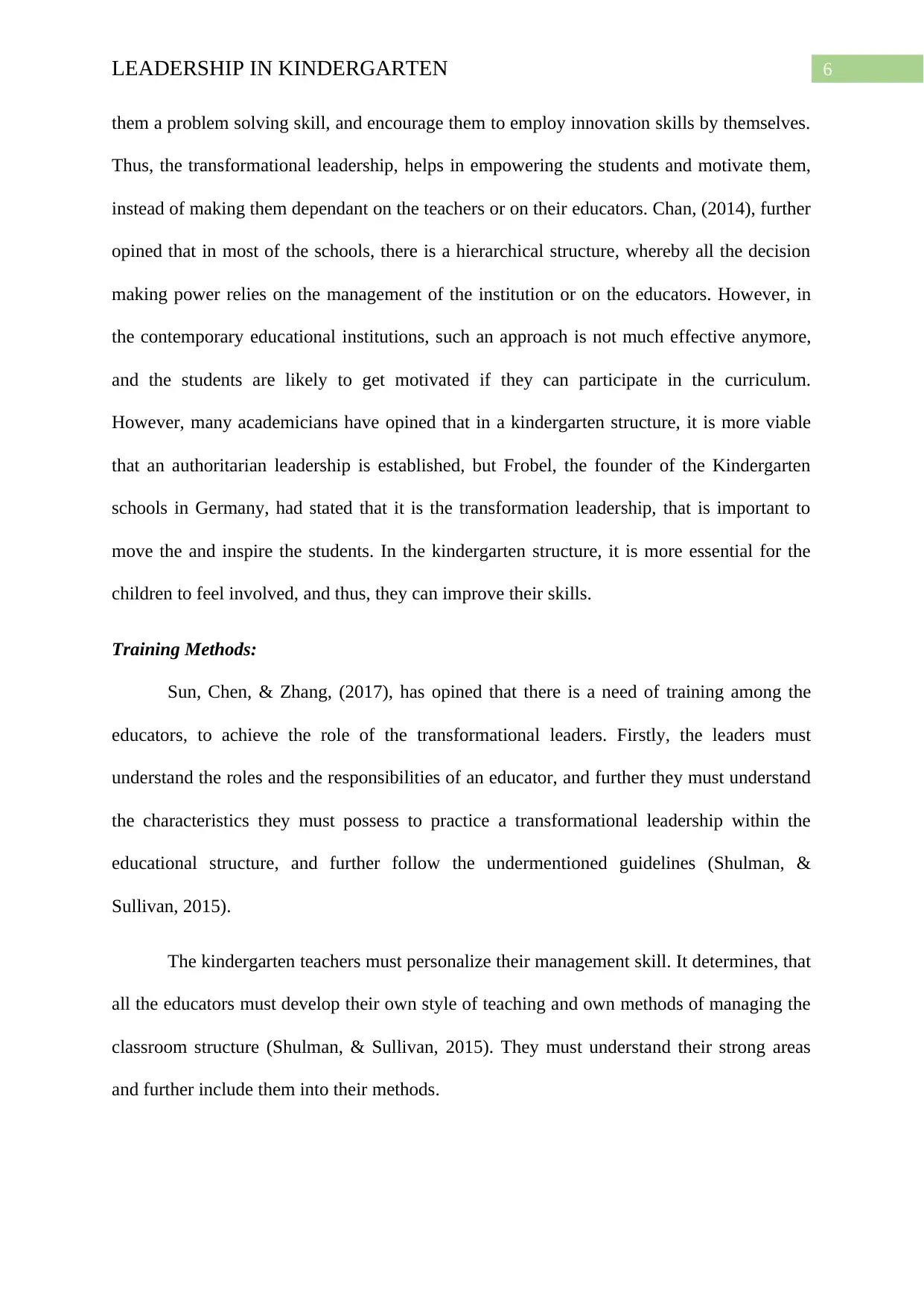
6LEADERSHIP IN KINDERGARTEN
them a problem solving skill, and encourage them to employ innovation skills by themselves.
Thus, the transformational leadership, helps in empowering the students and motivate them,
instead of making them dependant on the teachers or on their educators. Chan, (2014), further
opined that in most of the schools, there is a hierarchical structure, whereby all the decision
making power relies on the management of the institution or on the educators. However, in
the contemporary educational institutions, such an approach is not much effective anymore,
and the students are likely to get motivated if they can participate in the curriculum.
However, many academicians have opined that in a kindergarten structure, it is more viable
that an authoritarian leadership is established, but Frobel, the founder of the Kindergarten
schools in Germany, had stated that it is the transformation leadership, that is important to
move the and inspire the students. In the kindergarten structure, it is more essential for the
children to feel involved, and thus, they can improve their skills.
Training Methods:
Sun, Chen, & Zhang, (2017), has opined that there is a need of training among the
educators, to achieve the role of the transformational leaders. Firstly, the leaders must
understand the roles and the responsibilities of an educator, and further they must understand
the characteristics they must possess to practice a transformational leadership within the
educational structure, and further follow the undermentioned guidelines (Shulman, &
Sullivan, 2015).
The kindergarten teachers must personalize their management skill. It determines, that
all the educators must develop their own style of teaching and own methods of managing the
classroom structure (Shulman, & Sullivan, 2015). They must understand their strong areas
and further include them into their methods.
them a problem solving skill, and encourage them to employ innovation skills by themselves.
Thus, the transformational leadership, helps in empowering the students and motivate them,
instead of making them dependant on the teachers or on their educators. Chan, (2014), further
opined that in most of the schools, there is a hierarchical structure, whereby all the decision
making power relies on the management of the institution or on the educators. However, in
the contemporary educational institutions, such an approach is not much effective anymore,
and the students are likely to get motivated if they can participate in the curriculum.
However, many academicians have opined that in a kindergarten structure, it is more viable
that an authoritarian leadership is established, but Frobel, the founder of the Kindergarten
schools in Germany, had stated that it is the transformation leadership, that is important to
move the and inspire the students. In the kindergarten structure, it is more essential for the
children to feel involved, and thus, they can improve their skills.
Training Methods:
Sun, Chen, & Zhang, (2017), has opined that there is a need of training among the
educators, to achieve the role of the transformational leaders. Firstly, the leaders must
understand the roles and the responsibilities of an educator, and further they must understand
the characteristics they must possess to practice a transformational leadership within the
educational structure, and further follow the undermentioned guidelines (Shulman, &
Sullivan, 2015).
The kindergarten teachers must personalize their management skill. It determines, that
all the educators must develop their own style of teaching and own methods of managing the
classroom structure (Shulman, & Sullivan, 2015). They must understand their strong areas
and further include them into their methods.
Paraphrase This Document
Need a fresh take? Get an instant paraphrase of this document with our AI Paraphraser
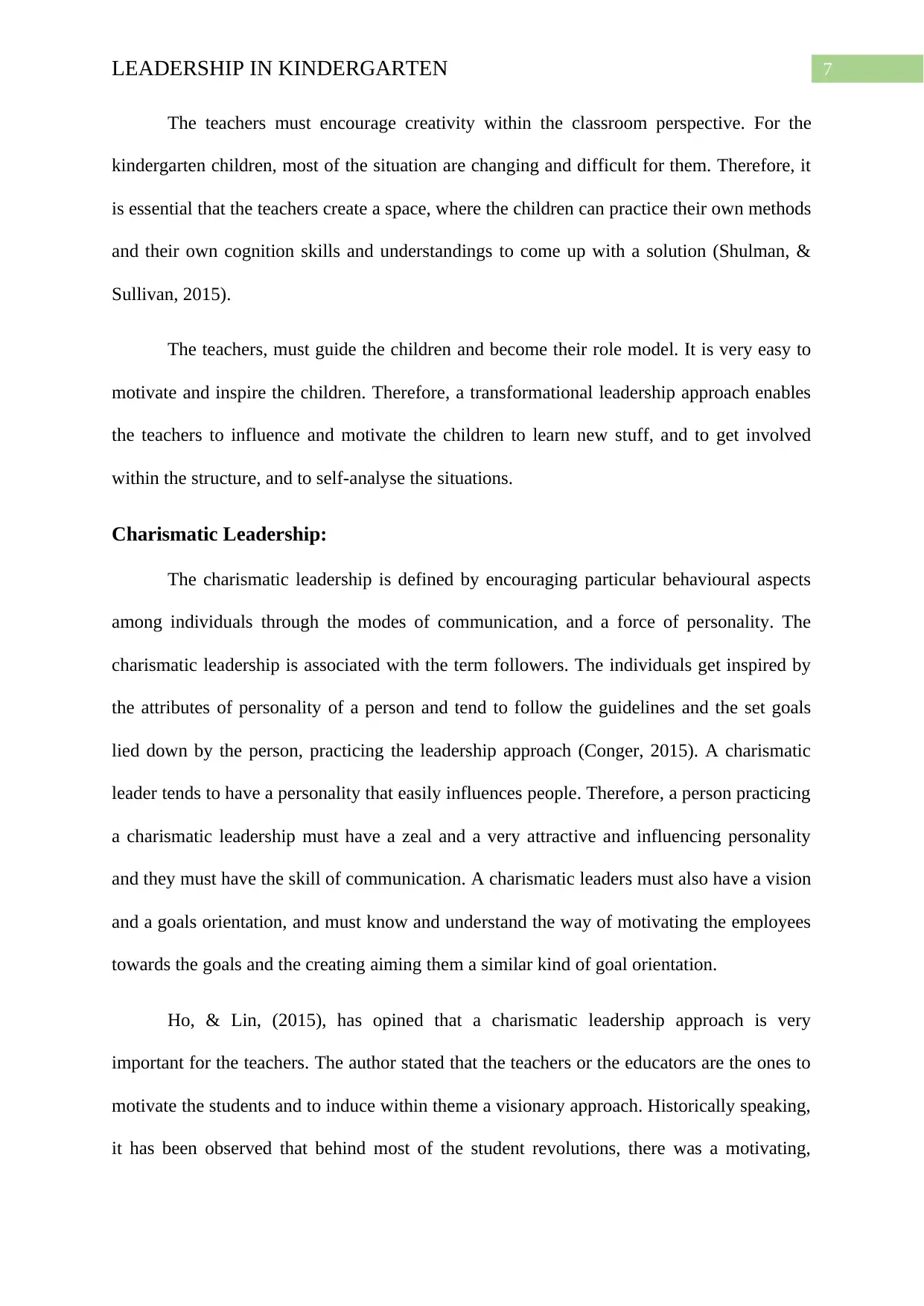
7LEADERSHIP IN KINDERGARTEN
The teachers must encourage creativity within the classroom perspective. For the
kindergarten children, most of the situation are changing and difficult for them. Therefore, it
is essential that the teachers create a space, where the children can practice their own methods
and their own cognition skills and understandings to come up with a solution (Shulman, &
Sullivan, 2015).
The teachers, must guide the children and become their role model. It is very easy to
motivate and inspire the children. Therefore, a transformational leadership approach enables
the teachers to influence and motivate the children to learn new stuff, and to get involved
within the structure, and to self-analyse the situations.
Charismatic Leadership:
The charismatic leadership is defined by encouraging particular behavioural aspects
among individuals through the modes of communication, and a force of personality. The
charismatic leadership is associated with the term followers. The individuals get inspired by
the attributes of personality of a person and tend to follow the guidelines and the set goals
lied down by the person, practicing the leadership approach (Conger, 2015). A charismatic
leader tends to have a personality that easily influences people. Therefore, a person practicing
a charismatic leadership must have a zeal and a very attractive and influencing personality
and they must have the skill of communication. A charismatic leaders must also have a vision
and a goals orientation, and must know and understand the way of motivating the employees
towards the goals and the creating aiming them a similar kind of goal orientation.
Ho, & Lin, (2015), has opined that a charismatic leadership approach is very
important for the teachers. The author stated that the teachers or the educators are the ones to
motivate the students and to induce within theme a visionary approach. Historically speaking,
it has been observed that behind most of the student revolutions, there was a motivating,
The teachers must encourage creativity within the classroom perspective. For the
kindergarten children, most of the situation are changing and difficult for them. Therefore, it
is essential that the teachers create a space, where the children can practice their own methods
and their own cognition skills and understandings to come up with a solution (Shulman, &
Sullivan, 2015).
The teachers, must guide the children and become their role model. It is very easy to
motivate and inspire the children. Therefore, a transformational leadership approach enables
the teachers to influence and motivate the children to learn new stuff, and to get involved
within the structure, and to self-analyse the situations.
Charismatic Leadership:
The charismatic leadership is defined by encouraging particular behavioural aspects
among individuals through the modes of communication, and a force of personality. The
charismatic leadership is associated with the term followers. The individuals get inspired by
the attributes of personality of a person and tend to follow the guidelines and the set goals
lied down by the person, practicing the leadership approach (Conger, 2015). A charismatic
leader tends to have a personality that easily influences people. Therefore, a person practicing
a charismatic leadership must have a zeal and a very attractive and influencing personality
and they must have the skill of communication. A charismatic leaders must also have a vision
and a goals orientation, and must know and understand the way of motivating the employees
towards the goals and the creating aiming them a similar kind of goal orientation.
Ho, & Lin, (2015), has opined that a charismatic leadership approach is very
important for the teachers. The author stated that the teachers or the educators are the ones to
motivate the students and to induce within theme a visionary approach. Historically speaking,
it has been observed that behind most of the student revolutions, there was a motivating,
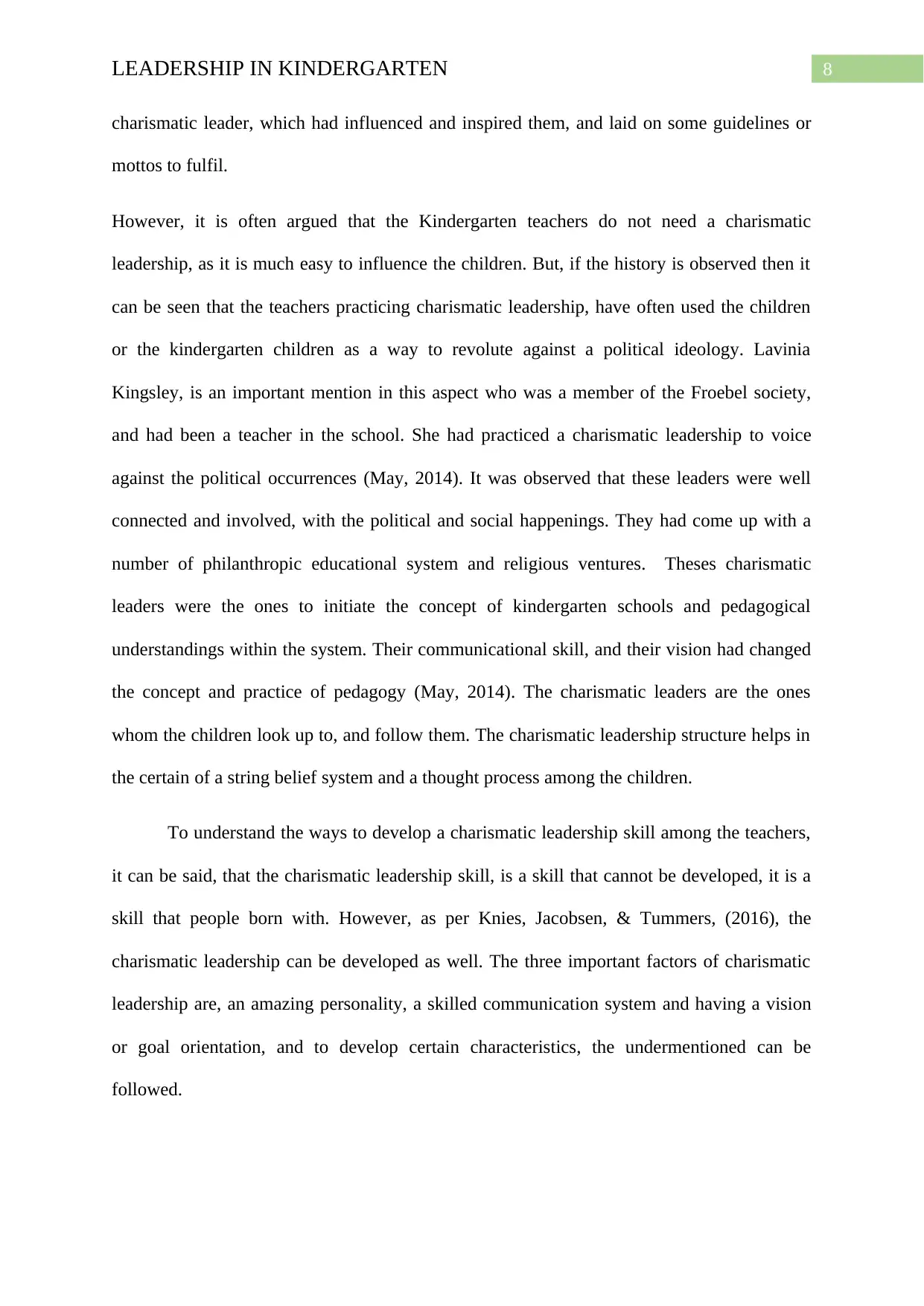
8LEADERSHIP IN KINDERGARTEN
charismatic leader, which had influenced and inspired them, and laid on some guidelines or
mottos to fulfil.
However, it is often argued that the Kindergarten teachers do not need a charismatic
leadership, as it is much easy to influence the children. But, if the history is observed then it
can be seen that the teachers practicing charismatic leadership, have often used the children
or the kindergarten children as a way to revolute against a political ideology. Lavinia
Kingsley, is an important mention in this aspect who was a member of the Froebel society,
and had been a teacher in the school. She had practiced a charismatic leadership to voice
against the political occurrences (May, 2014). It was observed that these leaders were well
connected and involved, with the political and social happenings. They had come up with a
number of philanthropic educational system and religious ventures. Theses charismatic
leaders were the ones to initiate the concept of kindergarten schools and pedagogical
understandings within the system. Their communicational skill, and their vision had changed
the concept and practice of pedagogy (May, 2014). The charismatic leaders are the ones
whom the children look up to, and follow them. The charismatic leadership structure helps in
the certain of a string belief system and a thought process among the children.
To understand the ways to develop a charismatic leadership skill among the teachers,
it can be said, that the charismatic leadership skill, is a skill that cannot be developed, it is a
skill that people born with. However, as per Knies, Jacobsen, & Tummers, (2016), the
charismatic leadership can be developed as well. The three important factors of charismatic
leadership are, an amazing personality, a skilled communication system and having a vision
or goal orientation, and to develop certain characteristics, the undermentioned can be
followed.
charismatic leader, which had influenced and inspired them, and laid on some guidelines or
mottos to fulfil.
However, it is often argued that the Kindergarten teachers do not need a charismatic
leadership, as it is much easy to influence the children. But, if the history is observed then it
can be seen that the teachers practicing charismatic leadership, have often used the children
or the kindergarten children as a way to revolute against a political ideology. Lavinia
Kingsley, is an important mention in this aspect who was a member of the Froebel society,
and had been a teacher in the school. She had practiced a charismatic leadership to voice
against the political occurrences (May, 2014). It was observed that these leaders were well
connected and involved, with the political and social happenings. They had come up with a
number of philanthropic educational system and religious ventures. Theses charismatic
leaders were the ones to initiate the concept of kindergarten schools and pedagogical
understandings within the system. Their communicational skill, and their vision had changed
the concept and practice of pedagogy (May, 2014). The charismatic leaders are the ones
whom the children look up to, and follow them. The charismatic leadership structure helps in
the certain of a string belief system and a thought process among the children.
To understand the ways to develop a charismatic leadership skill among the teachers,
it can be said, that the charismatic leadership skill, is a skill that cannot be developed, it is a
skill that people born with. However, as per Knies, Jacobsen, & Tummers, (2016), the
charismatic leadership can be developed as well. The three important factors of charismatic
leadership are, an amazing personality, a skilled communication system and having a vision
or goal orientation, and to develop certain characteristics, the undermentioned can be
followed.
⊘ This is a preview!⊘
Do you want full access?
Subscribe today to unlock all pages.

Trusted by 1+ million students worldwide
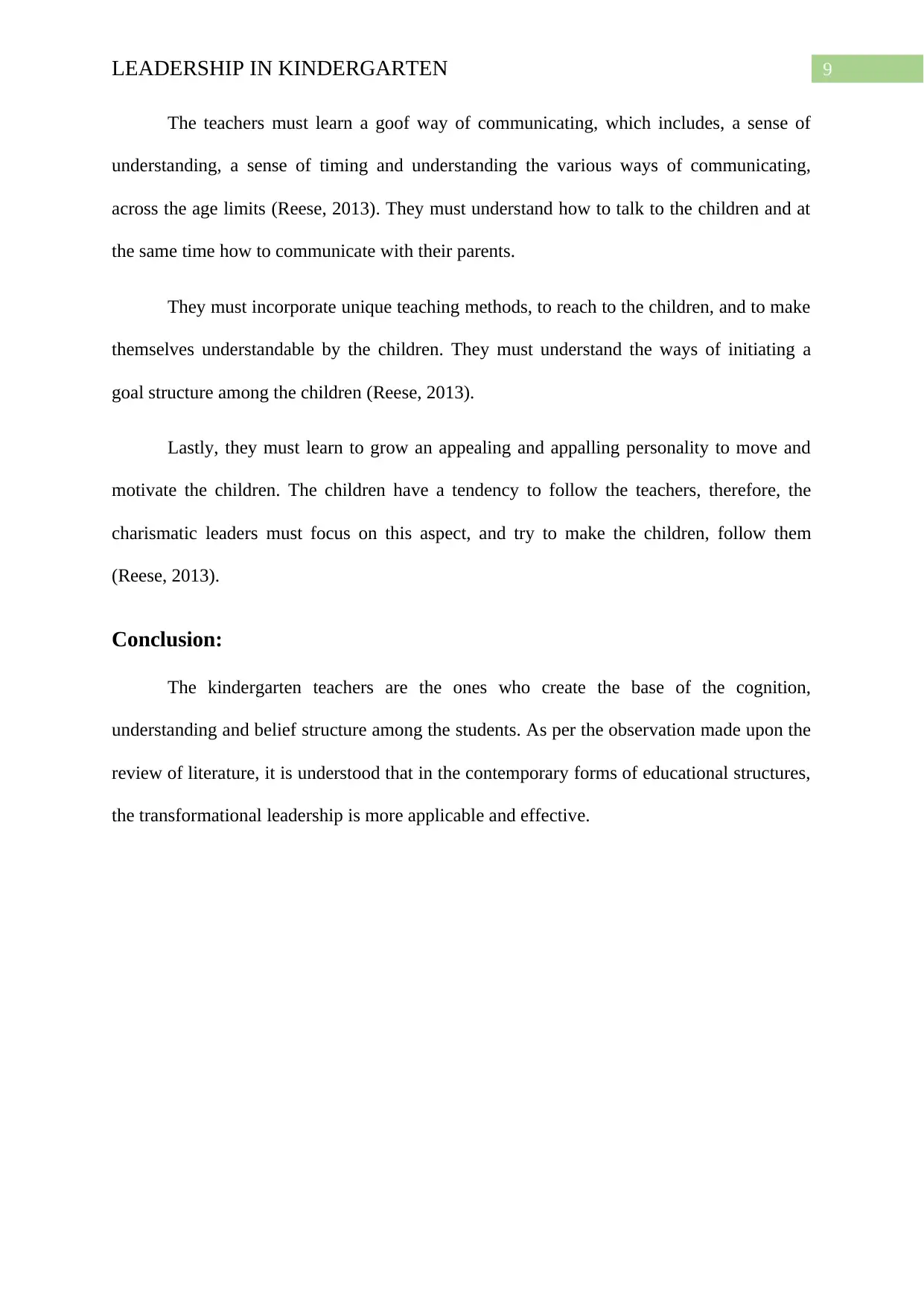
9LEADERSHIP IN KINDERGARTEN
The teachers must learn a goof way of communicating, which includes, a sense of
understanding, a sense of timing and understanding the various ways of communicating,
across the age limits (Reese, 2013). They must understand how to talk to the children and at
the same time how to communicate with their parents.
They must incorporate unique teaching methods, to reach to the children, and to make
themselves understandable by the children. They must understand the ways of initiating a
goal structure among the children (Reese, 2013).
Lastly, they must learn to grow an appealing and appalling personality to move and
motivate the children. The children have a tendency to follow the teachers, therefore, the
charismatic leaders must focus on this aspect, and try to make the children, follow them
(Reese, 2013).
Conclusion:
The kindergarten teachers are the ones who create the base of the cognition,
understanding and belief structure among the students. As per the observation made upon the
review of literature, it is understood that in the contemporary forms of educational structures,
the transformational leadership is more applicable and effective.
The teachers must learn a goof way of communicating, which includes, a sense of
understanding, a sense of timing and understanding the various ways of communicating,
across the age limits (Reese, 2013). They must understand how to talk to the children and at
the same time how to communicate with their parents.
They must incorporate unique teaching methods, to reach to the children, and to make
themselves understandable by the children. They must understand the ways of initiating a
goal structure among the children (Reese, 2013).
Lastly, they must learn to grow an appealing and appalling personality to move and
motivate the children. The children have a tendency to follow the teachers, therefore, the
charismatic leaders must focus on this aspect, and try to make the children, follow them
(Reese, 2013).
Conclusion:
The kindergarten teachers are the ones who create the base of the cognition,
understanding and belief structure among the students. As per the observation made upon the
review of literature, it is understood that in the contemporary forms of educational structures,
the transformational leadership is more applicable and effective.
Paraphrase This Document
Need a fresh take? Get an instant paraphrase of this document with our AI Paraphraser
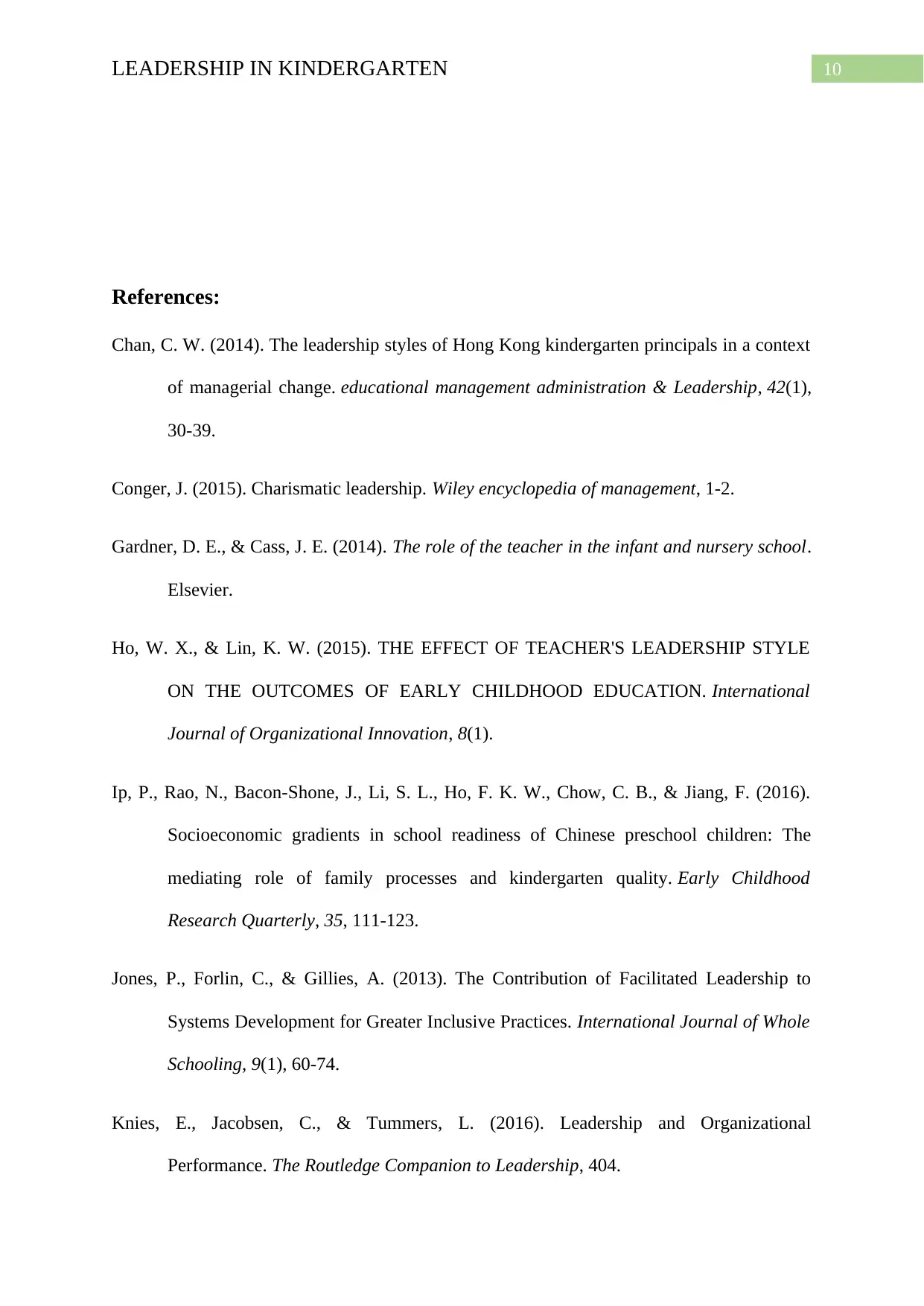
10LEADERSHIP IN KINDERGARTEN
References:
Chan, C. W. (2014). The leadership styles of Hong Kong kindergarten principals in a context
of managerial change. educational management administration & Leadership, 42(1),
30-39.
Conger, J. (2015). Charismatic leadership. Wiley encyclopedia of management, 1-2.
Gardner, D. E., & Cass, J. E. (2014). The role of the teacher in the infant and nursery school.
Elsevier.
Ho, W. X., & Lin, K. W. (2015). THE EFFECT OF TEACHER'S LEADERSHIP STYLE
ON THE OUTCOMES OF EARLY CHILDHOOD EDUCATION. International
Journal of Organizational Innovation, 8(1).
Ip, P., Rao, N., Bacon-Shone, J., Li, S. L., Ho, F. K. W., Chow, C. B., & Jiang, F. (2016).
Socioeconomic gradients in school readiness of Chinese preschool children: The
mediating role of family processes and kindergarten quality. Early Childhood
Research Quarterly, 35, 111-123.
Jones, P., Forlin, C., & Gillies, A. (2013). The Contribution of Facilitated Leadership to
Systems Development for Greater Inclusive Practices. International Journal of Whole
Schooling, 9(1), 60-74.
Knies, E., Jacobsen, C., & Tummers, L. (2016). Leadership and Organizational
Performance. The Routledge Companion to Leadership, 404.
References:
Chan, C. W. (2014). The leadership styles of Hong Kong kindergarten principals in a context
of managerial change. educational management administration & Leadership, 42(1),
30-39.
Conger, J. (2015). Charismatic leadership. Wiley encyclopedia of management, 1-2.
Gardner, D. E., & Cass, J. E. (2014). The role of the teacher in the infant and nursery school.
Elsevier.
Ho, W. X., & Lin, K. W. (2015). THE EFFECT OF TEACHER'S LEADERSHIP STYLE
ON THE OUTCOMES OF EARLY CHILDHOOD EDUCATION. International
Journal of Organizational Innovation, 8(1).
Ip, P., Rao, N., Bacon-Shone, J., Li, S. L., Ho, F. K. W., Chow, C. B., & Jiang, F. (2016).
Socioeconomic gradients in school readiness of Chinese preschool children: The
mediating role of family processes and kindergarten quality. Early Childhood
Research Quarterly, 35, 111-123.
Jones, P., Forlin, C., & Gillies, A. (2013). The Contribution of Facilitated Leadership to
Systems Development for Greater Inclusive Practices. International Journal of Whole
Schooling, 9(1), 60-74.
Knies, E., Jacobsen, C., & Tummers, L. (2016). Leadership and Organizational
Performance. The Routledge Companion to Leadership, 404.
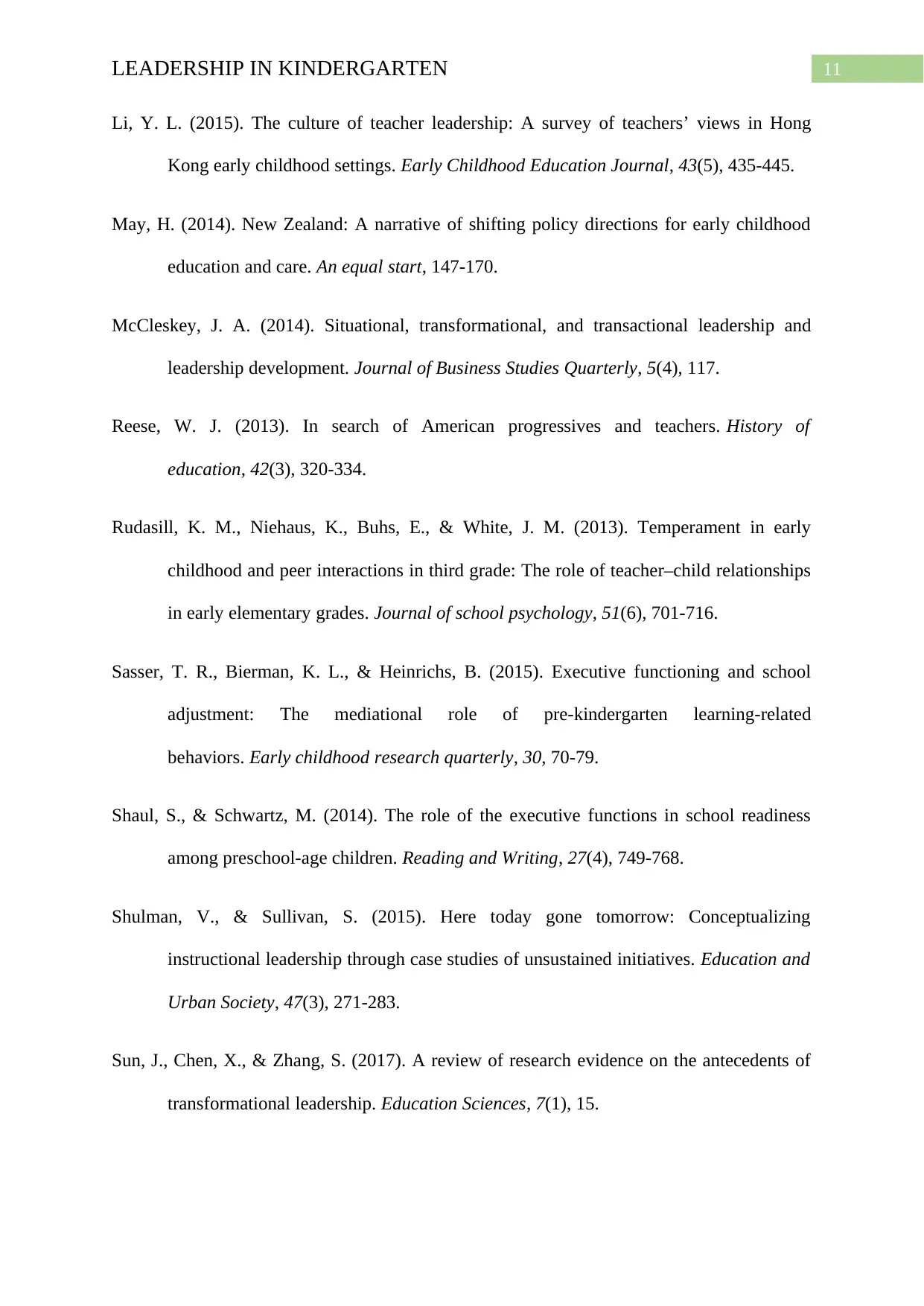
11LEADERSHIP IN KINDERGARTEN
Li, Y. L. (2015). The culture of teacher leadership: A survey of teachers’ views in Hong
Kong early childhood settings. Early Childhood Education Journal, 43(5), 435-445.
May, H. (2014). New Zealand: A narrative of shifting policy directions for early childhood
education and care. An equal start, 147-170.
McCleskey, J. A. (2014). Situational, transformational, and transactional leadership and
leadership development. Journal of Business Studies Quarterly, 5(4), 117.
Reese, W. J. (2013). In search of American progressives and teachers. History of
education, 42(3), 320-334.
Rudasill, K. M., Niehaus, K., Buhs, E., & White, J. M. (2013). Temperament in early
childhood and peer interactions in third grade: The role of teacher–child relationships
in early elementary grades. Journal of school psychology, 51(6), 701-716.
Sasser, T. R., Bierman, K. L., & Heinrichs, B. (2015). Executive functioning and school
adjustment: The mediational role of pre-kindergarten learning-related
behaviors. Early childhood research quarterly, 30, 70-79.
Shaul, S., & Schwartz, M. (2014). The role of the executive functions in school readiness
among preschool-age children. Reading and Writing, 27(4), 749-768.
Shulman, V., & Sullivan, S. (2015). Here today gone tomorrow: Conceptualizing
instructional leadership through case studies of unsustained initiatives. Education and
Urban Society, 47(3), 271-283.
Sun, J., Chen, X., & Zhang, S. (2017). A review of research evidence on the antecedents of
transformational leadership. Education Sciences, 7(1), 15.
Li, Y. L. (2015). The culture of teacher leadership: A survey of teachers’ views in Hong
Kong early childhood settings. Early Childhood Education Journal, 43(5), 435-445.
May, H. (2014). New Zealand: A narrative of shifting policy directions for early childhood
education and care. An equal start, 147-170.
McCleskey, J. A. (2014). Situational, transformational, and transactional leadership and
leadership development. Journal of Business Studies Quarterly, 5(4), 117.
Reese, W. J. (2013). In search of American progressives and teachers. History of
education, 42(3), 320-334.
Rudasill, K. M., Niehaus, K., Buhs, E., & White, J. M. (2013). Temperament in early
childhood and peer interactions in third grade: The role of teacher–child relationships
in early elementary grades. Journal of school psychology, 51(6), 701-716.
Sasser, T. R., Bierman, K. L., & Heinrichs, B. (2015). Executive functioning and school
adjustment: The mediational role of pre-kindergarten learning-related
behaviors. Early childhood research quarterly, 30, 70-79.
Shaul, S., & Schwartz, M. (2014). The role of the executive functions in school readiness
among preschool-age children. Reading and Writing, 27(4), 749-768.
Shulman, V., & Sullivan, S. (2015). Here today gone tomorrow: Conceptualizing
instructional leadership through case studies of unsustained initiatives. Education and
Urban Society, 47(3), 271-283.
Sun, J., Chen, X., & Zhang, S. (2017). A review of research evidence on the antecedents of
transformational leadership. Education Sciences, 7(1), 15.
⊘ This is a preview!⊘
Do you want full access?
Subscribe today to unlock all pages.

Trusted by 1+ million students worldwide
1 out of 13
Related Documents
Your All-in-One AI-Powered Toolkit for Academic Success.
+13062052269
info@desklib.com
Available 24*7 on WhatsApp / Email
![[object Object]](/_next/static/media/star-bottom.7253800d.svg)
Unlock your academic potential
Copyright © 2020–2026 A2Z Services. All Rights Reserved. Developed and managed by ZUCOL.




